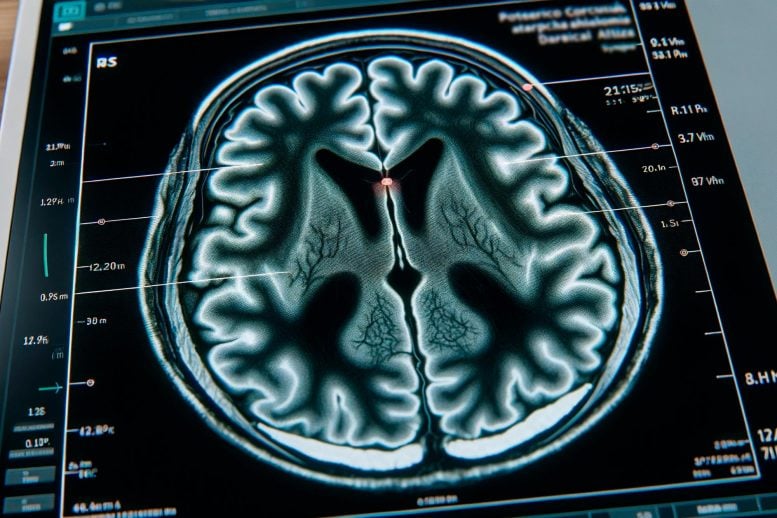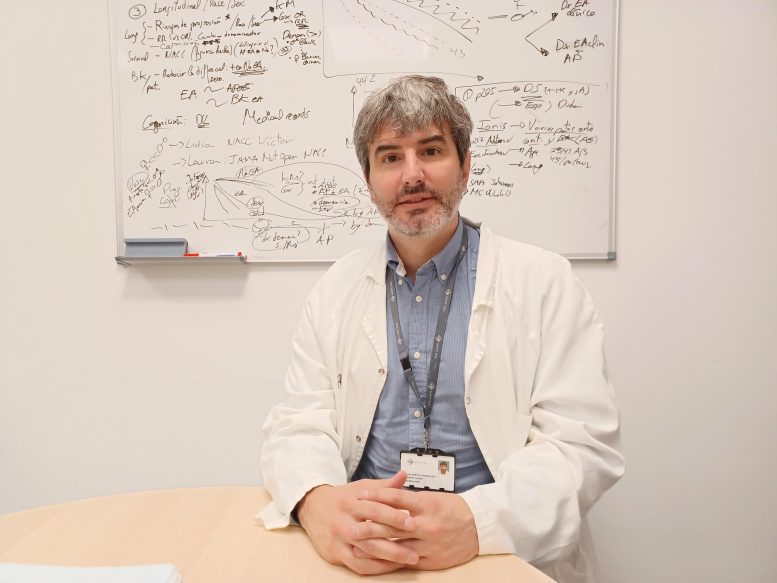
Study shows almost all individuals with two copies of the APOE4 gene develop Alzheimer’s, indicating a new genetic form of the disease. Credit: SciTechDaily
Scientists have discovered that nearly all individuals with two copies of the APOE4 gene will develop signs of Alzheimer’s disease, suggesting a distinct genetic form of Alzheimer’s.
In a new study from the Research Area on Neurological Diseases, Neuroscience, and Mental Health at the Sant Pau Research Institute, researchers found that more than 95% of individuals over the age of 65 who have two copies of the APOE4 gene show biological characteristics of Alzheimer’s pathology in the brain or biomarkers of this disease in cerebrospinal fluid and PET scans. They also discovered that these individuals, called APOE4 homozygotes, develop the disease earlier than those with other variants of the APOE gene.
These findings indicate that having two copies of the APOE4 gene could represent a new genetic form of Alzheimer’s disease.
“These data represent a reconceptualization of the disease or what it means to be homozygous for the APOE4 gene. This gene has been known for over 30 years and it was known to be associated with a higher risk of developing Alzheimer’s disease. But now we know that virtually all individuals with this duplicated gene develop Alzheimer’s biology. This is important because they represent between 2 and 3% of the population,” explained lead researcher Dr. Juan Fortea, Director of the Memory Unit of the Neurology Service at the Sant Pau Research Institute.

Researchers from the Research Area on Neurological Diseases, Neuroscience, and Mental Health at the Sant Pau Research Institute, led by Dr. Juan Fortea, Director of the Memory Unit of the Neurology Service at the same hospital, have found that over 95% of individuals over 65 years old who have two copies of the APOE4 gene -APOE4 homozygotes- show biological characteristics of Alzheimer’s pathology in the brain or biomarkers of this disease in cerebrospinal fluid and PET scans. Credit: Karla Islas Pieck – Institut de Recerca Sant Pau
Study Methodology and Findings
In their research, the team evaluated clinical, pathological, and biomarker changes in APOE4 homozygotes to determine their risk of developing Alzheimer’s disease. They utilized data from 3,297 brain donors, including samples from 273 APOE4 homozygotes from the National Alzheimer’s Coordinating Center and clinical and biomarker data from over 10,000 individuals, including 519 APOE4 homozygotes from five large multicenter cohorts of subjects with Alzheimer’s disease biomarkers.
They found that virtually all APOE4 homozygotes showed Alzheimer’s pathology and had higher levels of disease-associated biomarkers at age 55 compared to individuals with the APOE3 gene. At age 65, over 95% of APOE4 homozygotes showed abnormal levels of amyloid in cerebrospinal fluid – a key early pathological feature in Alzheimer’s disease – and 75% had positive amyloid scans.
These results suggest that the genetic variant of the APOE4 gene is not only a risk factor for Alzheimer’s disease, but could also represent a distinct genetic form of Alzheimer’s disease.
“This reconceptualization of the disease is similar to what we proposed from Sant Pau with Down syndrome, which a few years ago was also not considered a genetically determined form of Alzheimer’s,” adds Fortea.
Clinical and Research Implications
These findings could be instrumental in the development of individualized prevention strategies, clinical trials, and targeted treatment approaches for this specific population. Dr. Alberto Lleó, a researcher in the Dementia Neurobiology Group at the Sant Pau Research Institute, points out that “the data clearly show that having two copies of the APOE4 gene not only increases the risk but also anticipates the onset of Alzheimer’s, reinforcing the need for specific preventive strategies.”
Furthermore, Dr. Víctor Montal, who actively participated in this research and now studies the molecular structure of the APOE gene at the Barcelona Supercomputing Center, adds that “the findings emphasize the importance of monitoring APOE4 homozygotes from an early age for preventive interventions.”
Reference: “APOE4 homozygozity represents a distinct genetic form of Alzheimer’s disease” by Juan Fortea, Jordi Pegueroles, Daniel Alcolea, Olivia Belbin, Oriol Dols-Icardo, Lídia Vaqué-Alcázar, Laura Videla, Juan Domingo Gispert, Marc Suárez-Calvet, Sterling C. Johnson, Reisa Sperling, Alexandre Bejanin, Alberto Lleó and Víctor Montal, 6 May 2024, Nature Medicine.
DOI: 10.1038/s41591-024-02931-w









Be the first to comment on "Researchers Identify New Genetic Form of Alzheimer’s Disease"